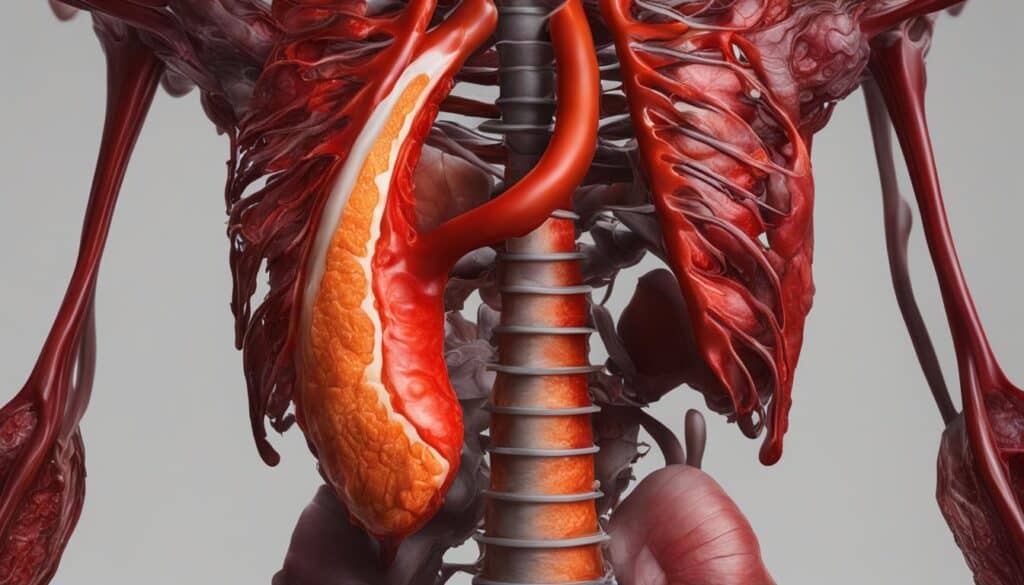Developing healthy eating habits is crucial for maintaining overall well-being. By making conscious choices about what we eat and how we nourish our bodies, we can greatly impact our physical and mental health. In this article, we will explore the top 10 healthy eating habits that can help you on your journey to a nourished life.
Key Takeaways:
- Balance your meals by including a variety of nutrient-rich foods.
- Control your portion sizes to maintain a healthy weight.
- Eat mindfully, savoring each bite and paying attention to your body’s hunger and fullness cues.
- Avoid or limit processed foods that are high in added sugars, unhealthy fats, and sodium.
- Stay hydrated by drinking plenty of water throughout the day.
These are just a few of the habits that can contribute to a healthier lifestyle. By incorporating these practices into your daily routine, you can take control of your health and well-being. So why wait? Start making healthier choices today and enjoy the benefits of a nourished life.
Importance of Healthy Eating

Healthy eating plays a vital role in maintaining overall well-being and promoting a nourished life. By fueling your body with nutrient-rich foods, you provide the necessary fuel for optimal physical and mental performance. In addition to that, healthy eating lowers the risk of chronic diseases, enhances longevity, and supports weight management and energy balance.
When you prioritize healthy eating, you are giving your body the essential vitamins, minerals, and antioxidants it needs to function optimally. These nutrients are critical for supporting various bodily processes, from boosting your immune system to promoting healthy skin and improving cognitive function.
Fueling Your Body
Just like a car requires fuel to run, your body needs proper nutrition to function at its best. Healthy eating provides the necessary nutrients to fuel your body, giving you the energy you need throughout the day. By consuming a well-balanced diet, you can ensure that you have sustained energy levels, preventing energy crashes and fatigue.
Moreover, healthy eating is essential for weight management. By maintaining a healthy weight, you can reduce the risk of obesity and related health conditions such as heart disease, diabetes, and certain types of cancer. Eating nutrient-rich foods, along with regular physical activity, helps maintain a healthy energy balance, ensuring that you consume the right amount of calories for your body’s needs.
The Power of Nutrient-Rich Foods
Nutrient-rich foods are the backbone of a healthy eating plan. These foods are packed with essential vitamins, minerals, and antioxidants that support overall health and well-being. Fruits, vegetables, whole grains, lean proteins, and healthy fats are all examples of nutrient-rich foods.
By including a variety of these foods in your diet, you can ensure that your body receives a wide range of nutrients necessary for proper functioning. For example, fruits and vegetables are excellent sources of vitamins and minerals, while lean proteins provide essential amino acids needed for muscle repair and growth. Healthy fats like those found in avocados, nuts, and olive oil provide beneficial fatty acids that support heart health and brain function.
Incorporating nutrient-rich foods into your diet not only improves your overall health but also helps prevent nutrient deficiencies, which can lead to various health problems. By choosing these foods, you are nourishing your body and giving it the tools it needs to thrive.
The Building Blocks of Health: Nutrient-Rich Foods

Nutrient-rich foods play a vital role in supporting our overall health and well-being. These foods are packed with essential vitamins, minerals, and antioxidants that our bodies need to thrive. By incorporating a variety of nutrient-dense foods into our diets, we can boost our immune system, support digestion, and promote glowing skin.
A key component of a nutrient-rich diet is colorful fruits and vegetables. These vibrant foods provide a wide range of vitamins, minerals, and phytonutrients that are essential for optimal health. Whether it’s the antioxidants in blueberries, the beta-carotene in carrots, or the vitamin C in oranges, each colorful fruit and vegetable offers its unique health benefits.
Whole grains are another important component of a nutrient-rich diet. They are rich in fiber, vitamins, and minerals that support digestion, regulate blood sugar levels, and contribute to a healthy heart. Whole grains such as quinoa, brown rice, and whole wheat pasta are excellent choices to include in your meals.
Lean proteins are essential for building and repairing tissues, supporting muscle growth, and maintaining a strong immune system. Incorporate lean proteins such as chicken, turkey, fish, tofu, and legumes into your meals to ensure an adequate intake of essential amino acids.
Healthy fats are an often-overlooked but critical component of a nutrient-rich diet. They provide energy, support brain function, and help absorb fat-soluble vitamins. Choose sources of healthy fats like avocados, nuts, seeds, and olive oil to promote optimal health.
The image above represents a colorful assortment of fruits and vegetables, demonstrating the importance of including a variety of vibrant, nutrient-dense foods in our diets.
Energy Balance and Weight Management

Eating a balanced energy intake that aligns with your body’s needs is crucial for promoting weight management. When it comes to maintaining a healthy weight, it’s not just about counting calories, but about consuming nutrient-dense foods that provide sustained energy and support your overall well-being.
By choosing nutrient-dense foods, you can optimize your energy levels and avoid energy crashes and sugar cravings that often come with consuming highly processed or sugary foods. These nutrient-dense options nourish your body with essential vitamins, minerals, and antioxidants, helping you stay satisfied and focused throughout the day.
Some examples of nutrient-dense foods include:
- Leafy green vegetables like spinach and kale
- Colorful fruits such as berries and citrus fruits
- Lean proteins like chicken, fish, and tofu
- Whole grains like quinoa and brown rice
- Healthy fats from sources like avocados, nuts, and seeds
These foods not only provide essential nutrients but also help regulate your blood sugar levels, support digestion, and promote a healthy metabolism. By incorporating them into your meals and snacks, you can maintain a balanced energy intake and optimize your weight management efforts.
Eating nutrient-dense foods is like fueling your body with high-quality energy. It not only helps you manage your weight but also supports overall health and well-being.
Remember, weight management is a journey, and it’s important to focus on sustainable lifestyle changes rather than quick fixes. By making nutritious choices and prioritizing balanced meals, you can create a foundation for long-term weight management and improved health.
Gut Health: The Gut-Brain Connection

Your gut health is not solely focused on digestion; it plays a crucial role in your overall well-being. The digestive system is home to trillions of bacteria that make up your gut microbiome. These bacteria are involved in numerous bodily functions, including nutrient absorption, immune system regulation, and even mental health.
A healthy gut microbiome requires a diverse range of beneficial bacteria to function optimally. One way to promote a healthy gut is through a diet rich in fiber, prebiotics, and probiotics.
The Role of Fiber:
Fiber, found in plant-based foods such as fruits, vegetables, whole grains, and legumes, is essential for maintaining gut health. It provides nourishment for the good bacteria in your gut and helps regulate bowel movements, preventing constipation.
Fiber also acts as a prebiotic, serving as food for beneficial gut bacteria. By including fiber-rich foods in your diet, you support the growth of these beneficial bacteria, which can have a positive impact on your mental health.
The Power of Prebiotics:
Prebiotics are non-digestible fibers that promote the growth and activity of healthy bacteria in your gut. They act as fuel for the beneficial bacteria, helping them flourish and maintain balance in your gut microbiome.
Some good sources of prebiotics include onions, garlic, bananas, asparagus, and oats. By incorporating these foods into your diet, you can enhance your gut health and potentially improve your mental well-being.
The Benefits of Probiotics:
Probiotics, on the other hand, are live bacteria and yeasts that provide specific health benefits when consumed. These beneficial microbes can populate your gut and help restore balance in your gut microbiome.
Probiotics can be found in fermented foods like yogurt, kefir, sauerkraut, and kimchi. They can also be taken as supplements. Including probiotic-rich foods or supplements in your diet can support a healthy gut and potentially have a positive impact on your mental health.
Remember, a healthy gut leads to a healthy mind. By nourishing your gut with fiber, prebiotics, and probiotics, you can promote a thriving gut microbiome and support your mental well-being.
With the understanding that gut health extends beyond digestion, it’s important to prioritize the health of your gut microbiome. Incorporate fiber-rich foods, prebiotics, and probiotics into your diet to foster a healthy gut and potentially improve your mood, anxiety levels, and cognitive function.
Reduced Risk of Chronic Diseases

Research has shown that maintaining a diet rich in whole, nutrient-dense foods can have a significant impact on reducing the risk of chronic diseases such as heart disease, diabetes, and certain types of cancer. By incorporating antioxidant-rich foods into your meals, you can combat inflammation and oxidative stress, two major contributors to these diseases.
Antioxidants play a crucial role in protecting the body’s cells from damage caused by free radicals. Free radicals are unstable molecules that are produced naturally in the body and can cause inflammation and oxidative stress when their levels become excessive. Chronic inflammation and oxidative stress have been linked to the development of various chronic diseases, including heart disease, diabetes, and certain types of cancer.
Incorporating antioxidant-rich foods into your diet can help counteract the harmful effects of free radicals and reduce inflammation. Some examples of antioxidant-rich foods include berries, dark leafy greens, nuts, seeds, and colorful fruits and vegetables.
“A diet rich in whole, nutrient-dense foods is not only beneficial for nourishing your body, but it also plays a vital role in reducing the risk of chronic diseases.”
By focusing on consuming a variety of nutrient-dense foods, you can provide your body with the necessary vitamins, minerals, and antioxidants it needs to function optimally and lower the risk of chronic diseases. Additionally, these foods are generally low in added sugars, unhealthy fats, and refined grains, which are known to contribute to the development of chronic diseases.
It is important to note that while a healthy diet is a crucial component in reducing the risk of chronic diseases, it is just one piece of the puzzle. Regular exercise, maintaining a healthy weight, managing stress, and avoiding smoking are also important factors in overall disease prevention.
In summary, adopting a diet rich in whole, nutrient-dense foods and incorporating antioxidant-rich foods can significantly reduce the risk of chronic diseases such as heart disease, diabetes, and certain types of cancer. By prioritizing these dietary choices, you can help protect your body from inflammation and oxidative stress, promoting better long-term health.
Boosting Mental Clarity and Mood

When it comes to mental clarity and mood stability, your food choices play a significant role in supporting these aspects of your well-being. Incorporating certain foods rich in omega-3 fatty acids can have a positive impact on cognitive function and mood.
Fatty fish, such as salmon, mackerel, and trout, are excellent sources of omega-3 fatty acids. These essential fats are known to nourish the brain and support mental clarity. Including fatty fish in your diet can enhance cognitive function, improve memory, and boost overall brain health.
In addition to fatty fish, nuts and seeds are also rich in omega-3 fatty acids. Walnuts, chia seeds, and flaxseeds are great options to consider. These snacks not only provide a satisfying crunch but also contribute to mood stability and mental well-being.
Research suggests that omega-3 fatty acids help regulate neurotransmitters in the brain, which play a crucial role in mood regulation. By incorporating these foods into your diet, you can support a positive mood and enhance mental clarity.
Practical Tips for Embracing Healthy Eating

Embracing a healthy eating lifestyle can be made easier with practical tips and habits that promote a nutritious and well-rounded diet. Incorporating these habits into your daily routine can help you make healthier choices and improve your overall well-being.
- Meal Planning: Plan your meals in advance to ensure you have nutritious options readily available. This can help you avoid impulsively reaching for unhealthy snacks or fast food.
- Hydration: Stay hydrated throughout the day by drinking an adequate amount of water. Proper hydration supports digestion, helps control appetite, and promotes overall health.
- Mindful Eating: Practice mindful eating by paying attention to your body’s hunger and fullness cues. Take your time to savor each bite, chewing slowly and enjoying the flavors and textures of the food.
- Moderation: Practice moderation by enjoying your favorite indulgences in smaller portions. Allowing yourself the occasional treat can help you maintain a balanced relationship with food.
- Reading Food Labels: Take the time to read food labels and understand the ingredients and nutritional information. This can help you make informed decisions and choose healthier options.
- Cooking at Home: Cook meals at home whenever possible, as this gives you more control over the ingredients and portion sizes. Experiment with healthy recipes and try new flavors and ingredients.
By incorporating these practical tips into your daily life, you can develop healthy eating habits that contribute to your overall well-being and long-term health goals.
Healthy Eating Simplified

When it comes to healthy eating, it’s important to focus on some key nutrition basics for optimal well-being. Prioritizing nutrient-rich foods, considering nutrient density, incorporating diet diversity, balancing macronutrient ratios, and limiting highly processed foods are essential strategies to maintain a healthy lifestyle.
One of the foundations of healthy eating is prioritizing nutrient-rich foods. These include fresh fruits and vegetables, whole grains, lean proteins, and healthy fats. These foods are packed with vitamins, minerals, and antioxidants that are essential for overall health and well-being. Prioritizing these nutrient-dense options ensures that your body gets the necessary nourishment it needs.
In addition to nutrient density, it’s crucial to incorporate diet diversity. Eating a variety of foods enables you to get a wide range of nutrients and promotes a healthy gut microbiome. Experimenting with different fruits, vegetables, grains, and proteins not only keeps your meals interesting but also supports your body’s natural defenses.
Another aspect to consider is the balance of macronutrient ratios. Balancing carbohydrates, proteins, and fats in your meals helps provide sustained energy and satiety. While individual macronutrient requirements may vary, focusing on a well-rounded diet that includes all three macronutrients is important for overall health.
Lastly, limiting highly processed foods is crucial for healthy eating. These foods tend to be low in nutrient density and high in added sugars, unhealthy fats, and artificial ingredients. By reducing your consumption of processed foods, you can make room for more whole, natural foods that provide essential nutrients and support your well-being.
Adopting these practices simplifies the concept of healthy eating. By prioritizing nutrient-rich foods, incorporating diet diversity, balancing macronutrient ratios, and limiting processed foods, you can take important steps towards a healthier and more nourished life.
Nutrient Density

Nutrient density is an important concept in healthy eating. It refers to the amount of nutrients that a food contains relative to its calorie content. Prioritizing nutrient-dense foods is key to ensuring that you are getting the essential nutrients your body needs to function optimally.
When it comes to nutrient density, it’s important to focus on a variety of nutrients such as protein, carbohydrates, fats, vitamins, and minerals. These nutrients play vital roles in supporting various bodily functions and promoting overall health.
One way to ensure you are consuming nutrient-dense foods is by incorporating a variety of fruits, vegetables, whole grains, lean proteins, and healthy fats into your diet. These foods are packed with essential nutrients and provide your body with the fuel it needs to thrive.
For example, protein is crucial for building and repairing tissues, while carbohydrates are the body’s main source of energy. Healthy fats are essential for hormone production and the absorption of fat-soluble vitamins, while vitamins and minerals are involved in numerous bodily processes.
By prioritizing nutrient-dense foods, you can ensure that your body is receiving the necessary nutrients it needs to function optimally and support your overall health.
Diet Diversity

Eating a variety of foods is essential for promoting optimal health and well-being. Not only does it provide an array of nutrients, but it also plays a significant role in maintaining a healthy gut and body weight, as well as protecting against chronic diseases.
When we consume a diverse range of foods, we support the growth of beneficial gut bacteria, which are essential for proper digestion and nutrient absorption. These bacteria help break down and metabolize the foods we eat, ensuring that our bodies can extract the maximum nutritional value from them.
Moreover, a diverse diet can help with weight management. Research suggests that people who consume a wider variety of foods are more likely to have a healthier body weight compared to those with a limited range of foods in their diet. By incorporating a variety of fruits, vegetables, whole grains, lean proteins, and healthy fats into your meals, you can achieve a well-rounded and sustainable approach to weight management.
In addition to promoting gut health and maintaining a healthy weight, dietary diversity is also associated with a reduced risk of chronic diseases. Consuming a wide range of nutrient-rich foods ensures that you are obtaining a broad spectrum of vitamins, minerals, antioxidants, and other essential compounds that offer protection against chronic conditions such as heart disease, diabetes, and certain types of cancer.
To expand your dietary diversity, try introducing new foods gradually into your meals. Experiment with exotic fruits and vegetables, whole grains, and different sources of lean proteins to add variety and excitement to your plate. Embrace the flavors and textures that come with a diverse diet, and let your taste buds explore the wide range of culinary options available.
Remember, a diverse diet not only nourishes your body but also brings enjoyment and satisfaction to your meals. By embracing diet diversity, you can unlock a world of flavors, enhance your overall well-being, and take important steps towards protecting yourself against chronic diseases.
Macronutrient Ratios

When planning your meals and snacks, it’s important to consider the balance of macronutrients for both satiety and taste. While counting macros may be necessary for specific goals, it’s not always required for maintaining a healthy diet. Instead, focus on creating balanced meals that include a good mix of carbohydrates, fats, and proteins.
Macronutrients are the three main components of our diet that provide energy: carbohydrates, fats, and proteins. Each macronutrient plays a crucial role in our body’s functions and should be included in our meals in appropriate proportions.
Carbohydrates are our body’s main source of energy. They are found in foods like grains, fruits, vegetables, and legumes. Including complex carbohydrates, such as whole grains, in your meals can provide sustained energy and help regulate blood sugar levels.
Fats are essential for many bodily functions, including the absorption of vitamins and the maintenance of cell membranes. Healthy sources of fats include avocados, nuts, seeds, and olive oil. Incorporate these foods into your diet to promote optimal brain health and hormone production.
Proteins are the building blocks of our bodies, contributing to the growth and repair of tissues and the synthesis of enzymes and hormones. Incorporate lean sources of protein, such as poultry, fish, tofu, and legumes, into your meals to support muscle growth and maintenance.
Aim for balanced meals that include a variety of macronutrients. For example, a balanced meal could consist of a serving of whole grain carbohydrates, a portion of lean protein, and a source of healthy fats like avocado or olive oil. This combination will provide you with the necessary energy and nutrients to support your overall health and well-being.
Remember, macronutrient ratios can vary depending on individual needs and goals. It’s always best to consult with a healthcare professional or registered dietitian for personalized advice.
Limiting Highly Processed Foods

Highly processed foods have become increasingly popular in today’s fast-paced society. However, they are often associated with numerous health risks, making it important to limit their consumption in favor of whole, nutrient-dense foods.
Ultra-processed foods, such as packaged snacks, sugary beverages, and pre-packaged meals, are typically high in added sugars, unhealthy fats, and artificial additives. Regular consumption of these foods has been linked to an increased risk of obesity, heart disease, type 2 diabetes, and other chronic conditions.
While some processing is necessary for food preservation and safety, it’s crucial to prioritize whole foods that are minimally processed and closer to their natural state. Whole foods, such as fruits, vegetables, whole grains, lean proteins, and healthy fats, are nutrient-dense and provide a wide array of essential vitamins, minerals, and antioxidants.
By choosing whole, nutrient-dense foods, you can maximize your intake of beneficial nutrients while minimizing the consumption of harmful additives found in ultra-processed foods. This can have a positive impact on your overall health and well-being.
It’s important to read food labels carefully to identify highly processed ingredients and make informed choices. Look for ingredients that you recognize and understand. Opt for foods with shorter ingredient lists and avoid those with added sugars, artificial additives, and excessive sodium levels.
Incorporating more whole foods into your diet can be as simple as replacing processed snacks with fresh fruits, choosing whole-grain options over refined grains, and preparing meals at home using fresh ingredients. Eating a balanced diet rich in nutrient-dense foods will not only improve your physical well-being, but also support your energy levels, mental clarity, and overall vitality.
Remember, moderation is key. While it’s unrealistic to completely eliminate processed foods from your diet, aim to limit their intake and prioritize whole, nutrient-dense foods for optimal health.
Moderation and Personalization

When it comes to healthy eating, finding the right balance is key. It’s not about depriving yourself but practicing moderation and personalizing your diet to suit your individual preferences and needs. This approach allows you to prioritize food enjoyment while maintaining a balanced relationship with food.
Personalizing your diet means tailoring it to your unique taste preferences, cultural background, and dietary restrictions. It’s about choosing foods that you genuinely enjoy and that nourish your body. By incorporating the foods you love into your meal plan, you’re more likely to stick to a healthy eating routine for the long term.
Remember, a personalized diet doesn’t mean you have free reign to indulge in unhealthy foods all the time. It’s about finding a balance between nourishing your body and treating yourself occasionally. Allowing yourself to enjoy your favorite foods in moderation can help prevent feelings of deprivation and promote a positive relationship with food.
Benefits of Moderation and Personalization
Moderation and personalization in your diet offer several advantages:
- Diet sustainability: By incorporating foods you enjoy, you’re more likely to stick to a healthy eating plan in the long term.
- Mental and emotional well-being: Allowing yourself to enjoy treats in moderation can promote positive emotions, reduce cravings, and prevent feelings of guilt associated with restrictive diets.
- Improved adherence: Personalizing your diet helps you create a plan that aligns with your lifestyle, making it easier to stick to it consistently.
- Better overall satisfaction: Enjoying a variety of foods and finding balance promotes overall satisfaction and prevents feelings of deprivation, leading to a more sustainable and enjoyable eating experience.
By adopting a personalized diet and practicing moderation, you can maintain a healthy and nourishing relationship with food while still enjoying the pleasures of eating.
Remember:
“The key to a healthy diet is finding the balance between nourishment and enjoyment.”
Making Healthy Eating Sustainable
Embracing healthy eating is not just a temporary fix, but a sustainable lifestyle choice that can have long-lasting benefits for your overall well-being. Instead of resorting to short-term diets, focus on making small changes that you can incorporate into your daily routine. These small changes add up over time and become a part of your lifestyle, making healthy eating a natural and effortless habit.
View healthy eating as a long-term commitment to yourself and your health. This mindset shift can help you stay motivated and dedicated to making healthier choices consistently. Remember, it’s not about perfection or strict rules, but about making progress and finding what works best for you.
Start by identifying easy and manageable changes you can make in your eating habits. It could be as simple as swapping sugary drinks for water, adding more fruits and vegetables to your meals, or cooking at home instead of relying on takeout. These small changes may seem insignificant at first, but they lay the foundation for a sustainable and healthy lifestyle.
Remember, sustainable healthy eating is not an all-or-nothing approach. It’s about finding balance and enjoying all types of foods in moderation. Allow yourself flexibility and the occasional indulgence, while still maintaining an overall nutritious diet. By focusing on making small changes and committing to long-term well-being, you can cultivate a sustainable lifestyle that supports your health and happiness.
 Fullersears
Fullersears





